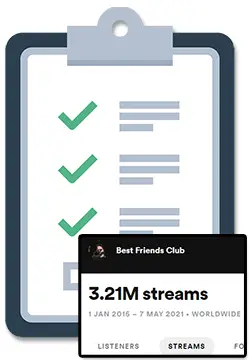After writing and releasing your music, you may be wondering if you need to sign up with BMI or Songtrust (or even both) to make sure you get all the money that is owed to you.
I’ve researched the differences and similarities between Songtrust and BMI, tested out Songtrust with my own music, and then wrote about everything for you here. 😊
The main difference between Songtrust and BMI is that Songtrust collects mechanical and performance royalties from around the world while BMI only collects performance royalties in the United States.
Songtrust is a publishing administration company that helps artists collect publishing, mechanical, and live performance royalties from around the globe.
BMI is an American performance rights organization that focuses on helping artists collect performance royalties.
Essentially, Songtrust is a company that works with performance rights organizations from all around the world to collect both mechanical and performance royalties for you.
On the other hand, BMI is just one of those performance rights organizations that Songtrust works with.
For a full breakdown of the two, and which is right for you, simply keep on reading, my friend. 🙂
Do You Need Songtrust and BMI?
Only performance rights organizations, like BMI (Broadcast Music, Inc.), can collect and distribute performance royalties to songwriters.
However, Songtrust can collect these royalties on behalf of songwriters from performance rights organizations and even help songwriters register directly to performance rights organizations right from their Songtrust account.
As mentioned earlier in this article, the key difference between Songtrust and BMI is that Songtrust collects performance and mechanical royalties from publishing rights organizations from all around the world.
So, in addition to managing your music catalog with BMI (or your performance rights organization of your choice) and collecting your performance royalties from them, Songtrust can also increase your income by collecting global performance royalties and mechanical royalties.
Songtrust is also quite flexible with how all of this works.
If you’re already registered with BMI (or any other performance rights organization), you are free to choose to have Songtrust manage parts of your music catalog and leave the rest to be done directly with your performance rights organization.
If you’re not yet registered, Songtrust can take care of that and cover any fees for you.
In short: a local performance rights organization like BMI is needed to collect your performance royalties where as a company like Songtrust is handy to make sure you collect all the different royalties owed to you.
So.. how am I handling all of this?
Personally, I am directly registered with SOCAN (the Canadian performance rights organization) and the society that represents my catalog in the US is BMI.
On top of this, I’ve joined Songtrust to handle the collection of all my global royalties and mechanical royalties, as well as make it easy for me to manage my music catalog and upload new songs from one dashboard.
I think that Songtrust makes sense for my personal situation because the music I make under the name Best Friends Club makes 10,000s of streams per month from all around the world.
It would simply be too much work for me personally to sign up for performance rights organizations all around the world, register all my songs with each, and manage my catalog with each.
Later in this article, we’ll dive deeper into how YOU can exactly tell if you need Songtrust right now or if you can hold off on joining, but for now, let’s look at how Songtrust compares to similar companies to BMI.
Songtrust vs ASCAP
ASCAP (American Society of Composers, Authors and Publishers) is a performance rights organization that focuses on helping artists collect performance royalties.
Songtrust is a publishing administration company that helps artists collect publishing, mechanical, and live performance royalties from around the globe.
The main difference between Songtrust and ASCAP is that Songtrust collects mechanical and performance royalties from around the world while ASCAP only collects performance royalties in the United States.
To be honest, ASCAP is pretty much the same thing as BMI but internally handles some things differently. They collect the same royalties from the same places.
Songtrust vs SESAC
SESAC (originally the Society of European Stage Authors and Composers) is an invite-only performance rights organization that focuses on helping artists collect performance royalties.
Songtrust is a publishing administration company that helps artists collect publishing, mechanical, and live performance royalties from around the globe.
The main difference between Songtrust and SESAC is that Songtrust collects mechanical and performance royalties from around the world while SESAC only collects performance royalties in the United States.
Again, SESAC is pretty much the same as BMI and ASCAP and they collect the same types of royalties from the same places. The key difference is that SESAC is invite-only and you have to pay a fee to join them.
Songtrust vs SOCAN
SOCAN (Society of Composers, Authors and Music Publishers of Canada) is an Canadian performance rights organization that focuses on helping artists collect performance royalties.
Songtrust is a publishing administration company that helps artists collect publishing, mechanical, and live performance royalties from around the globe.
The main difference between Songtrust and SOCAN is that Songtrust collects mechanical and performance royalties from around the world while SOCAN only collects performance royalties in Canada and some international territories.
For all intents and purposes, you can look at SOCAN as the Canadian version of BMI or ASCAP.
Do I need Songtrust?
Songtrust is needed to help artists collect all the royalties from all over the globe that is owed to them so that they don’t have to do all that uncreative administration work themselves.
If an artist’s music is getting played 1000s of times from all around the world, it makes sense for an artist to join Songtrust.
If you’re working on a new musical project or if your musical project isn’t yet getting much attention or streams, there may not be any sense signing up with Songtrust quite yet.
Songtrust takes a small percentage (only 15%) of any royalties they collect, in addition to a $100 setup fee ($100). In my opinion, the 15% is not bad but you definitely want to be generating enough streams and plays to make back the initial setup fee.
Additionally, if your music is really only being streamed in 1 country, you can save Songtrust’s 15% cut and $100 setup fee and just sign up with the local PRO of your choice for free (although they only collect performance royalties and not mechanical royalties).
Consider joining Songtrust if:
- Your music is being played all around the world
- Your music is being played thousands of times per month
- You do not want to sign up and deal with PROs all around the world
- You do not want to (or can’t) sign a traditional publishing deal or create your own publishing company
- You’d prefer a simple way to collect all your music publishing royalties and feel confident you aren’t leaving any money on the table
If the above sounds like you, click here to learn more about getting up and running with Songtrust.
Hold off on joining Songtrust if:
- Your music is not currently getting very many plays per month
- Your music is only being played in 1 or 2 countries
If the above sounds like you, I’ve put together a free course called The 6 Secrets To Spotify Success that you can check out to learn how to bump your numbers up all around the globe. 🙂
Songtrust vs DistroKid
Songtrust is a publishing administration company that helps artists collect publishing, mechanical, and live performance royalties. DistroKid is a music distribution company that allows artists to get their music on online stores and streaming services.
The main difference between Songtrust and DistroKid is that they both collect different kinds of music royalties for you, while only DistroKid distributes your music.
Both companies get you paid, but for different aspects of music consumption, while only DistroKid can upload music. Songtrust collects publishing, mechanical, and live performance royalties while DistroKid collects master recording revenue.
For a complete breakdown of who collects what money for you, what the difference between Songtrust and DistroKid is, and if you need to have accounts with both, check out my article on Songtrust vs DistroKid. 🙂




